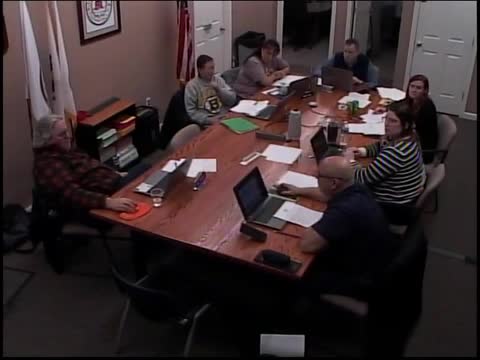UMass Collins Center presents tech and efficiency review; town pursues phased upgrades and customer-request system
Get AI-powered insights, summaries, and transcripts
Subscribe
Summary
Brianna Summer of the UMass Collins Center summarized a grant-funded technology audit on Feb. 3 and outlined a phased plan—already partly in progress—to expand e-permitting, launch a CRM called Hubfix, upgrade the town website, tighten document management, and use Microsoft 365 automation to streamline town operations.
Brianna Summer, a consultant with the Collins Center at UMass Boston, presented a technology and efficiency review to the Hubbardston Select Board on Feb. 3, summarizing findings from a Community Compact Best Practice grant and outlining a sequence of phased upgrades the town is implementing or seeking funds to complete.
The review, performed between early 2024 and late 2024, audited the town’s permitting and forms, legislative-management workflows, customer-service and request tracking, human-resources and accounting processes, website, and document-management practices. Summer said the project was designed to identify “where there might be room for improvement” and to leave money in the grant for implementation support.
Key recommendations and current work - E-permitting and forms: The consultants recommended expanding the online permitting portal to add missing application types, consolidate scattered PDFs and paper forms, and provide staff training. Summer said adding forms will create a “one-stop shop” for applicants. - Legislative management and website: The town is migrating to an upgraded municipal website (CivicPlus) that will include enhanced legislative-management tools, granular permissions for content publishing, and subscriber notifications. Summer and staff said the upgrade is already in progress and tied to other recommendations. - Constituent relationship management (CRM) — “Hubfix”: The town is piloting a customer-request system the consultant called “Hubfix” and tied to the town’s branding (HubConnect). The system routes incoming reports (potholes, signage issues, dog-licensing requests) to the appropriate department, supports attachments and map-based location selection, records timestamps, and can notify residents when issues are closed. Summer explained the backend will use workflow automation so requests can be routed and tracked, and staff can close a case to send an automatic email to the submitter. - Document management (Laserfiche integration): The audit recommended retraining staff on Laserfiche, standardizing storage practices, and integrating forms and completed transactions so documents automatically archive into the document-management system once processed. - Microsoft 365 and Power Automate: The town is consolidating into a single enterprise application (Microsoft 365) as a base platform and will use Power Automate for backend workflow triggers to connect forms, email notifications, and document workflows. - Training and implementation funding: The Collins Center emphasized ongoing staff training and built-in implementation assistance. The consultant said the town has already implemented several recommendations quickly and credited town staff for rapid progress.
Budget and grants Summer described a three-phase funding approach. Phase 1 used a Community Compact Best Practice grant for the discovery and initial implementation. The town then received a second community grant for continuity-of-operations work (documenting functions and building staff-facing intranet resources using Microsoft 365). The town administrator later submitted a Community Compact IT grant application to fund phase 2, which, if awarded, would pay for remaining website add-ons, kiosks, meeting-room equipment, the full CRM rollout, and vendor implementation assistance. Summer said, “should we get this grant, $20,000 in special town meeting funds will be returned to the coffers,” referring to temporary town funding used to secure the match.
Operational details and examples Summer and staff demonstrated how online forms and workflows could change specific processes: dog licensing is already online; permit workflows can be routed automatically through required reviewers (for example, fire and DPW) with timestamps; and payments can be processed via the same payment provider the town already uses (card fees around 2%; ACH free to the user). She described a planned kiosk for in-person customers at town facilities and integration that would reduce redundant manual scanning and filing.
Staff and board reaction Town Administrator Nate and staff described the town’s rapid implementation: new systems are already in progress and staff are receiving training. Board members asked technical and governance questions—how routing and reminders would work, data retention, ADA accessibility of the new website, and how permissions would be managed for who can publish town content. Summer addressed those questions, noting the website vendor has granular permissioning and CivicPlus and Microsoft tools provide built-in analytics and support.
Why it matters: The proposed changes aim to reduce repetitive work, create institutional knowledge that survives staff turnover, speed permitting and licensing, improve resident service response, and centralize records for transparency and public access. Many of the initiatives are already underway and would be extended if the town receives the IT grant.
What’s next: The town will continue implementation under existing grant funds, train staff on Laserfiche and Microsoft 365 features, and await the IT grant decision (application closed Feb. 6; staff expect notification in about two weeks). If awarded, the IT grant would fund expanded rollouts, kiosks, and vendor-assisted implementation and training.
